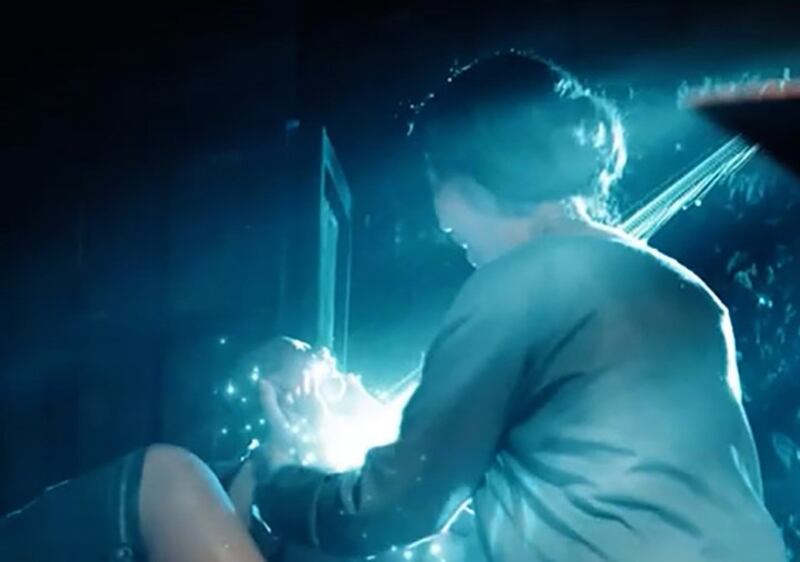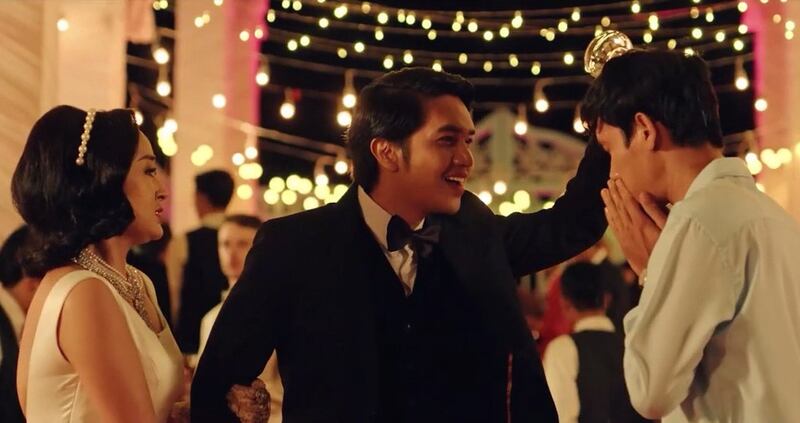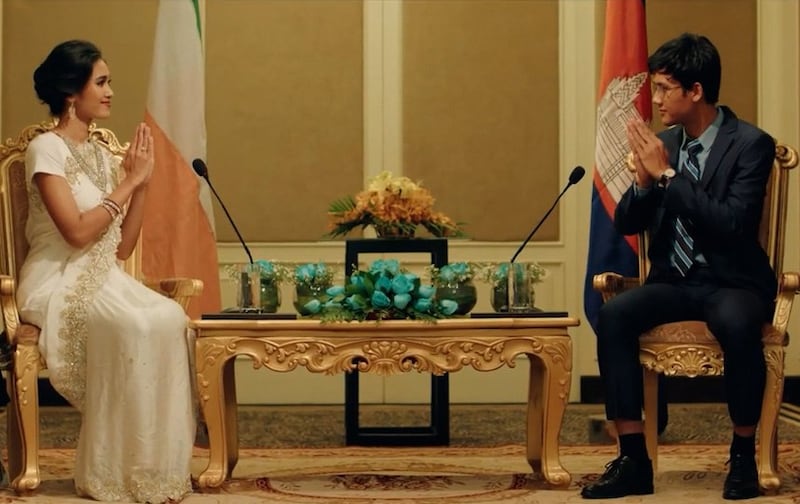A new biopic about Cambodian Prime Minister Hun Sen focuses on the now 70-year-old’s impoverished childhood, eschewing any mention of his time as a Khmer Rouge battalion commander to instead depict him as a bookish student who overcame bullying to achieve his destiny.
The 30-minute film, which opens with a scene of the future premier being struck by a burst of moonlight as his mother gives birth, is centered around Hun Sen's upbringing in Phnom Penh's Neakavoan pagoda, where he lived in the 1960s before joining the communist maquis in 1970.
Titled “Life of a Pagoda Boy,” it shows Hun Sen struggling to afford to eat after being sent to the city as a young child to study with monks, who teach him about Cambodian history and prophesize that he will grow powerful. His parents, meanwhile, are depicted as poor farmers who battle to survive and often fantasize about a life where they didn’t send him away.
“Because you’ll be far from your parents, you’ll have to struggle,” the father says as he sends Hun Sen away from the idyllic countryside, in a sequence that takes up the film’s first half. “Study hard,” his mother offers.
A series of rapid-fire scenes then culminate in Hun Sen’s rise to officialdom.
As he studies in the dying days of Prince Norodom Sihanouk’s rule in Phnom Penh, the young Hun Sen is bullied by the children of aristocrats, with his main tormentor bearing a clear resemblance to present-day opposition leader Sam Rainsy, whose father was a top minister in Sihanouk’s government.
When the bully pours a drink over Hun Sen’s head at a cocktail party and mocks him for being poor – as renowned Cambodian “Golden Era” pop singer Pan Ron plays live in the background – the film cuts to a monk making the prophecy that Hun Sen had been blessed and will grow powerful.
A final bullying scene then sees “Life of a Pagoda Boy” suddenly cut to its closing scene: an older and steely-eyed Hun Sen, now as the 27-year-old foreign minister in the Vietnamese-backed successor regime to the Khmer Rouge in the early 1980s, meets with Indian diplomats, as the credits roll.

Building a legacy ‘beyond political contestation’
The biopic was written by Hun Sen and cost $120,000 to produce, and premiered at the Ministry of Land Management in Phnom Penh on Sept. 28, according to pro-government local newspaper The Khmer Times.
Its release comes as the premier enters the twilight of his rule.
"The film is part of a process of memorialization that has been taking place for some time now," Sebastian Strangio, author of "Hun Sen's Cambodia," told Radio Free Asia, pointing also to the recent construction of the prime minister's " Win-Win Monument" on the outskirts of Phnom Penh.
“After so many years in power, it is clear that Hun Sen is starting to consider his legacy, and work out ways of ensuring that it survives his own eventual exit from the political scene,” he said. “In that sense, it is more than navel-gazing; it is an attempt to wreath Hun Sen’s legacy in the veil of legend, and to place it effectively beyond political contestation.”
Hun Sen has said he plans to run for reelection next year, before handing power to his son, Hun Manet, after the 2028 election, at which point he will have served as prime minister for 43 years. His Cambodian People’s Party (CPP), an outgrowth of the Hanoi-backed regime that replaced the Khmer Rouge in 1979, has faced little threat to its power since the opposition Cambodia National Rescue Party (CNRP) was forced to disband in 2017.
CPP spokesman Sok Eysan said he could not deny that the film had a political purpose. “There’s no one who doesn't want the benefits of telling stories,” Eysan told RFA. “It is to draw support and votes.”
But a critic of the CPP said that Hun Sen was looking beyond 2023.
But Buntenh, an activist monk who was exiled from Cambodia and is now based in Lowell, Massachusetts, told RFA he believed that the film was part of a propaganda push to make the case for continued Hun family rule.
“This is to divert the youth’s attention from the power transfer to his son. The youth who have an education do not believe in this transfer of power from father to son,” Buntenh said. “He has no other way to help his son.”
Buntenh said the film’s focus on Hun Sen’s childhood in a pagoda and on predictions of his rise made by monks was intended to convince people that his rule over the country was preordained and legitimate. That was important, he said, because his leadership of the country since 1985 had been marred by state corruption, stark inequality and human rights abuses.
“Hun Sen believes the Cambodian people believe in superstition and the abstract – things that do not have scientific proof. He understands they believe in fate, which is not in line with Buddhist faith,” he said. “This is the only way for Hun Sen to do promotion for his family dynasty.”
Widespread land-grabbing, deforestation, political violence and graft have marked Hun Sen’s decades of rule over Cambodia, with his government repeatedly pledging to stamp out each over the years to little avail. High-profile critics of the government have routinely been killed in broad daylight, including union leader Chea Vichea in 2004, environmentalist Chut Wutty in 2012 and political commentator Kem Ley in 2016.

‘Glossing over the unpleasantness’
Hun Sen’s efforts to guarantee succession to his eldest son come after the destruction of what was already a flimsy democracy in Cambodia.
The CNRP, which was created out of two rival opposition parties in 2012, came close to defeating Hun Sen’s CPP in the 2013 national election. But the party was then banned in the lead-up to the 2018 election, with opposition leader Kem Sokha jailed and a number of independent media outlets shuttered, including Radio Free Asia’s local offices.
Hun Sen’s party later won all 125 National Assembly seats on offer, with the premier appearing to grow more outwardly concerned with public perceptions of his legacy as he readies his country – and his party – for a succession.
Notably, in suddenly skipping from his childhood to his time as foreign minister, the film ignores Hun Sen’s time as a battalion commander in – and then defector from – the Khmer Rouge, which is estimated to have killed at least 1.7 million Cambodians, or almost a quarter of the country’s population at the time, during its three years in power.
The prime minister lost his left eye in fighting the day before Pol Pot’s forces took over Phnom Penh in April 1975, before defecting in 1977.
Such an omission was easy to understand from the prime minister’s perspective, said Sophal Ear, an associate professor in global development and Cambodia expert at Arizona State University in Phoenix.
“The inconvenient truth is the 1970s would have to explain his whereabouts,” Ear told RFA, adding Hun Sen was clearly not proud of all of his origin story. “What, indeed, was he up to? It's too complicated, so we dig a hole and bury the past. We gloss over the unpleasantness and skip a decade.”
“This is all part of a project to control the narrative; pagoda boy becomes savior of the nation. This is his legacy-building and legend-making.”

